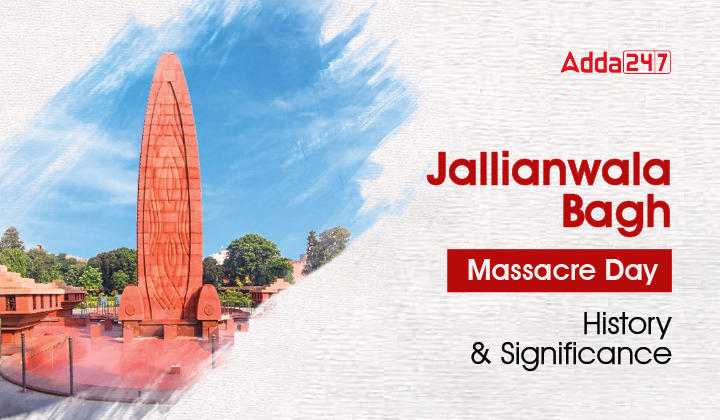Table of Contents
Jallianwala Bagh Massacre Day is a dark day in the history of India. On 13th April 1919, British troops massacred a peaceful crowd at Jallianwala Bagh in Amritsar. Hundreds of people died and even more, were injured. Jallianwala Bagh Massacre Day is observed to remember the death of hundreds of innocent people who defied the atrocious and oppressive British Rule in India.
Jallianwala Bagh Massacre Day Overview
Jallianwala Bagh Massacre Day is observed on the 13th of April every year. To commemorate the Jallianwala Bagh Hatyakand, the Jallianwala Bagh Memorial is been created on the exact spot where the massacre occurred in 1919. Every year, lakhs of people visit the Jallianwala Bagh Memorial to pay their respects and tribute.
| Jallianwala Bagh Massacre Day Overview | |
| Event | Jallianwala Bagh Massacre Day |
| Date of Occurrence | 13th April 1919 |
| What Happened? | British Troops open fire at a largely peaceful crowd including men, women, and children. |
| Place of Occurrence | Jallianwala Bagh, Amritsar, Punjab, India |
| Who Ordered Jallianwala Bagh Massacre | General Reginald Edward Harry Dyer |
| Number of People Who Died/ Injured (British Government Account) | 400+ people died and 1000+ people were injured |
| Number of People Who Died/ Injured (Indian Leaders Claim) | 1000+ people died and 1200+ people were injured |
Jallianwala Bagh Massacre Day History
The Rowlatt Act was a controversial law passed by the British Government in India in 1919, during the period of British colonial rule. The Rowlatt Act gave the British authorities in India sweeping powers to arrest and imprison individuals without trial for up to two years. It was passed as a response to the growing unrest and agitation for independence in India, which the British authorities viewed as a threat to their rule.
The Act was widely opposed by Indian political leaders, who saw it as a violation of their civil liberties and a betrayal of the principles of justice and fair play. On 13th April 1919, a largely peaceful crowd gathered to celebrate Baisakhi as a protest against the Rowlatt Act when the 144 Act was already imposed.
General Reginald Dyer, the commander of the British troops in Amritsar, considered the gathering to be a serious threat to British rule in India and ordered his troops to open fire on the unarmed crowd without any warning or provocation resulting in the Jallianwala Bagh Hatyakand. The firing continued for about 10 to 15 minutes, resulting in the death of over 400 people (according to British Official Account, however, it is claimed that more than 1000 people died and even more were injured), many of whom were innocent bystanders.
Jallianwala Bagh Massacre Day Significance
The Jallianwala Bagh Massacre had a significant impact on India’s struggle for independence from British rule. The brutal killing of innocent civilians by British troops sparked widespread outrage and led to a wave of protests and strikes across the country. The Indian National Congress, which was the leading political party in India at the time, condemned the massacre and demanded an immediate end to British rule in India.
Jallianwala Bagh Massacre Day Aftermath
The aftermath of the Jallianwala Bagh Massacre also had far-reaching consequences for British-Indian relations. The incident generated international condemnation, and the British authorities were criticized for their heavy-handed tactics and their disregard for the basic human rights of the Indian people.
The incident marked a turning point in the Indian independence movement, and it gave impetus to the non-violent civil disobedience movement led by Mahatma Gandhi. Rabindranath Tagore, the Bengali poet and Nobel laureate, gave up the knighthood that had been conferred upon him in 1915.
In response to the Jallianwala Bagh Hatyakand, the British Government appointed the Hunter Commission to investigate the incident and make recommendations to prevent similar incidents in the future. The Commission’s report condemned the actions of General Dyer and the British authorities, but it stopped short of holding them responsible for the massacre.
Jallianwala Bagh Massacre Day Observance
The Jallianwala Bagh Massacre remains a tragic reminder of the brutalities of colonialism and the importance of respecting the fundamental rights and freedoms of all individuals. The Jallianwala Bagh Massacre is remembered today as one of the darkest chapters in India’s struggle for independence. The day is observed as a day of remembrance and reflection, and it serves as a reminder of the importance of standing up against oppression and injustice, and the need to respect the fundamental rights and freedoms of all individuals.



 UGC NET Notification 2025 Out, Exam Date...
UGC NET Notification 2025 Out, Exam Date...
 CSIR NET Cut Off 2025, Download Subject ...
CSIR NET Cut Off 2025, Download Subject ...
 CSIR NET Scorecard 2025 Out, Download Re...
CSIR NET Scorecard 2025 Out, Download Re...














